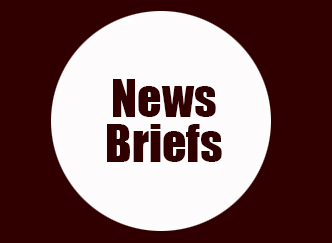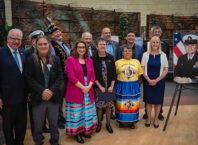USA Today Named MN Lt. Gov. Peggy Flannagan to Women of the Year List
AP – USA TODAY’s Women of the Year has added Peggy Flanagan to the list which was launched in 2022 as a continuation of Women of the Century, which commemorated the 100th anniversary of women gaining the right to vote.
Minnesota’s Lt. Gov. Peggy Flanagan (Ojibwe) is serving her second term as the second in command of the executive branch in Minnesota. She is the highest elected Native American woman in the United States. In December, Flanagan was the chair of the Democratic Lieutenant Governors Association, making history as the first Native American woman to lead a national political party committee.
See more at at womenoftheyear.usatoday.com.
==================================================
StrongHearts Native Helpline going strong
Minneapolis, MN – Over the course of seven years, StrongHearts Native Helpline established the first-ever phone and internet-based national helpline for Native Americans impacted by domestic and sexual violence. The need for a national helpline was recognized by The National Domestic Violence Hotline (The Hotline) in 2012, realizing that Native Americans were not reaching out for help.
This fact became even more disturbing when a study conducted by the Department of Justice (2016) revealed that Native Americans and Alaska Native women and men suffer violence at alarmingly high rates and predominantly at the hands of non-Natives.
StrongHearts advocates provide culturally appropriate support and advocacy to every contact, including non-Natives who reach out for help. We understand that domestic and sexual violence originated from sources outside of our communities and that by helping those who would do us harm, we also help ourselves.
StrongHearts Native Helpline serves all individuals who reach out for their services regardless of race, ethnicity, gender, gender identity, age, religion, national origin, sexual orientation, disability, or any other factor protected by local, state, or federal law. Call or text 1-844-762-8483 or chat online at strongheartshelpline.org.
==================================================
Cannabis growing facility is now under construction on Mille Lacs Band of Ojibwe tribal lands
Melissa Olson/MPR News – The Mille Lacs Band of Ojibwe is looking to stake its claim in Minnesota’s cannabis cultivation industry. Mille Lacs Corporate Ventures, the corporate entity owned by the band, announced they have begun construction on a 50,000 square-foot cannabis growing facility on tribal lands near Onamia.
Mille Lacs Corporate Ventures CEO Joe Nayquonabe, Jr. says that with more tribes and states getting into the cannabis industry, it’s important for the Mille Lacs Band to have a presence.
“We leaned on our tribal community to provide insight into this opportunity, paving a clear path into this venture,” said Nayquonabe.
A national cannabis law firm, Vicente LLP, estimated the cannabis market in Minnesota could generate as much as $1.5 billion in annual sales by the end of the decade.
Zach Atherton-Ely is the vice president of strategic growth for Mille Lacs Corporate Ventures. He says Mille Lacs may open a dispensary “eventually,” but for now the band will grow cannabis with an eye toward supplying other tribal dispensaries and state-licensed dispensaries once they are up and running.
Atherton-Ely says cultivating cannabis will help the tribe expand beyond their gaming business.
“Gaming has been under threat, at times, in Minnesota, and it will continue to be in the future,” said Atherton-Ely. “If tribes can find other significant revenue streams like the cannabis industry, then I think it helps provide security.”
(Minnesota Public Radio News can be heard on MPR’s statewide radio network or online.)
Biden taps $366M to fund clean energy for Native tribes/rural areas
AP/MPR News Staff – The federal government will fund 17 projects across the U.S. to expand access to renewable energy on Native American reservations and in other rural areas, the Biden administration announced on Tuesday.
The $366 million plan will fund solar, battery storage and hydropower projects in sparsely populated regions where electricity can be costly and unreliable. The money comes from a $1 trillion infrastructure law President Joe Biden signed in 2021.
About a fifth of homes in the Navajo Nation — located in northeastern Arizona, northwestern New Mexico and southeastern Utah — do not have access to electricity, the U.S. Department of Energy estimates. Nearly a third of homes that have electricity on Native American reservations in the U.S. report monthly outages, according to the Biden administration.
The announcement comes as Native tribes in Nevada and Arizona fight to protect their lands and sacred sites amid the Biden administration’s expansion of renewable energy. It also comes days after federal regulators granted Native American tribes more authority to block hydropower projects on their land.
The Biden administration will only secure funding for the 17 projects after negotiating with project applicants, federal officials said. Officials from the Department of Energy prepared to meet with tribal leaders to discuss clean energy projects at a summit in Southern California.
“President Biden firmly believes that every community should benefit from the nation’s historic transition to a clean energy future, especially those in rural and remote areas,” U.S. Energy Secretary Jennifer Granholm said in a statement.
The projects span across 20 states and involve 30 tribes. They include $30 million to provide energy derived from plants to wildfire-prone communities in the Sierra Nevada mountains in California and $32 million to build solar and hydropower to a Native American tribe in Washington state.
A consortium of rural electric cooperatives will create microgrids in seven rural communities across the country with $45.2 million. In Minnesota, a project benefiting the Shakopee Mdewakanton Sioux Community is one of those seven projects that will deploy microgrids as a part of the renewable energy funding.
Another $27 million will go toward constructing a hydroelectric plant to serve a tribal village in Alaska, while $57 million will provide solar power and storage for health centers in rural parts of the Southeast, including in Alabama, Georgia and South Carolina.







